Sunk into the unknown
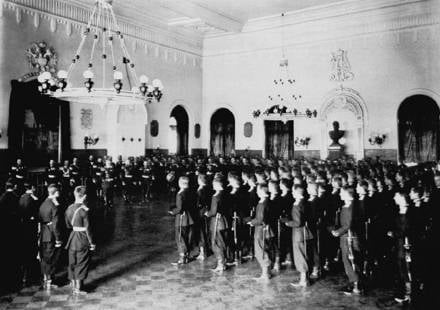 It so happened that prominent individuals more often receive recognition decades or even centuries after their demise. An accurate assessment of their scale and role in stories give distant descendants, because contemporaries for several reasons can not always judge them impartially. This is very clearly confirmed by the fate of General Alexander Pavlovich Kutepov. For many years his name was diligently ignored in our country, the biography was distorted, the feats accomplished in two wars were not remembered.
It so happened that prominent individuals more often receive recognition decades or even centuries after their demise. An accurate assessment of their scale and role in stories give distant descendants, because contemporaries for several reasons can not always judge them impartially. This is very clearly confirmed by the fate of General Alexander Pavlovich Kutepov. For many years his name was diligently ignored in our country, the biography was distorted, the feats accomplished in two wars were not remembered.He was born 16 September 1882, in the city of Cherepovets, Novgorod province in the family of Konstantin Mikhailovich and Olga Andreyevna Timofeev. The father of the future commander in his youth belonged to the petty-bourgeois class, but even before his marriage he was awarded the personal nobility for his zealous works in the field of public education. And grandfathers and great-grandfathers - they are just ordinary citizens, who by the sweat of their brows earned their daily bread.
The boy was not yet eight, when the first great grief in his life fell upon him - the head of the family died very badly after catching a cold. But Olga Andreevna widow did not take long, having entered into marriage with hereditary nobleman Pavel Alexandrovich Kutepov in 1892. The party turned out to be very successful: a young and pretty woman became a tender and loving companion to a high-ranking official of the Forester Corps, and he was a strict but caring mentor to her children, who immediately adopted them, which ensured a comfortable life and excellent education for Alexander and his two sisters. Alas, this union also turned out to be short-lived: after four years, Olga Andreevna left this world, and all the worries about the orphans completely fell on the shoulders of the inconsolable widower.
Neither Timofeev nor Kutepovs had any military in their kin. But Alexander from an early age experienced an unbridled attraction to military service. While still studying at the Arkhangelsk classical gymnasium, a boy given to himself (his parents and sisters lived in Kholmogory, where Pavel Aleksandrovich served) all weekend was lost in the barracks of the local infantry regiment. At first, the soldiers pestered him with questions about what, how, and why. And then, with the permission of the noncomors and the tacit approval of the officers, he began to practice various drill techniques, the secrets of caring for weapons, ammunition and other subtleties of military science.
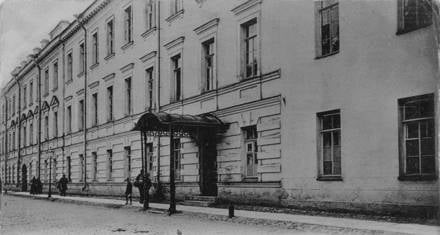 It got to the point that after graduating from 3 class, a thirteen-year-old high school boy asked his father to write a letter to the regimental commander asking him to allow his son to spend the summer holidays in the field camp of the military unit and to attend all classes. And it was allowed! Moreover, when the regiment reached the weekly maneuvers, the lad completed a foot three-day transition to 72 miles with rifle companies and participated in the training bayonet attack on the height occupied by the conventional opponent, which crowned him.
It got to the point that after graduating from 3 class, a thirteen-year-old high school boy asked his father to write a letter to the regimental commander asking him to allow his son to spend the summer holidays in the field camp of the military unit and to attend all classes. And it was allowed! Moreover, when the regiment reached the weekly maneuvers, the lad completed a foot three-day transition to 72 miles with rifle companies and participated in the training bayonet attack on the height occupied by the conventional opponent, which crowned him.“My parents,” General Kutepov will write in his memoirs much later, “at first they were very worried that I would not be coarse among the soldiers. But in front of me, child, these battered types of campaigners were always restrained and delicate. And I did not learn anything bad from them. But I can thank the Russian soldier for a lot. ”
In 1901, Alexander graduated from high school in 1-th category. And immediately told his father about his categorical decision to become a military man. Pavel Aleksandrovich approved the choice of his adopted son, and on July 9 of the year 1901, Kutepov Jr. was enlisted in the Arkhangelsk city reserve battalion as a private as a volunteer. And in early September, he passed the entrance exams to the St. Petersburg infantry cadet (later Vladimir military) school.
From the first course, Kutepov was predicted a great future. He studied well, a year later he was promoted to the corporal. Grandmaster Konstantin Konstantinovich, an uncle of the monarch, visited the 1903 school and visited the general inspector of military schools. After the parade, he personally presented the corporal Kutepov, flashing smartness and parachute training, in Feldwebel, bypassing the titles of junior and senior sword belt. It would not be superfluous to mention the following fact: shortly before graduation, Junker Kutepov became the winner of the Moscow inter-school fencing competition on espadrones (training blades).
Add to this an excellent erudition, brutal self-discipline, a heightened sense of honor - and it will become clear that the officer from Alexander turned out to be brilliant.
That confirmed the war ...
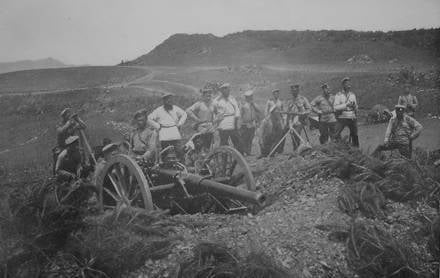 Brave and honest
Brave and honestHe received shoulder straps for the second lieutenant 1904 of the year, when fighting was raging in the Far East for six months already. A young officer, graduated on 1-th category and who had the right to choose the place of service, asked to distribute it to the military unit, which in the near future will go to the front. Which one, Kutepov was not important.
So the first place of his officer service was the 85 th Vyborg Infantry Regiment, where Alexander was appointed assistant chief of a horse hunting team (regimental reconnaissance company).
The archives did not preserve documents storing detailed descriptions of the glorious deeds accomplished by the intelligence officer Alexander Kutepov during the Russian-Japanese war. But even those scanty data from submissions to awards and fragmentary information from the memories of colleagues is quite enough to get an idea of this extraordinary person.
“This thin, youthful taut second lieutenant with small mustaches favorably differed from many colleagues,” colonel VD Shein writes in one of the issues of Scout magazine. - He did not drink vodka at all, did not play cards, spent all his time among his hunters. Before the front of the regiment, every knob, every scour and groove knew. And behind the line of trenches I felt at home. As a rule, on the night preceding the exploration by a large party or an entire team, Kutepov made one himself with one or two of his soldiers, carefully preparing future success. Risking himself personally, he tried to minimize the risk in the actions of subordinates. All of his nightly reconnaissance, and they happened almost 2 – 3 once a week, carried the imprint of thorough preparation, and the losses in the regimental hunters team were always insignificant.
Among the episodes of that period of Kutepov’s military service, a business trip to Mongolia for the purchase of horses is also listed. It was a rather dangerous trip, since a small detachment headed by an officer had several times to fight off the attack of the Hunhuz brigands. In one of the clashes, Alexander Pavlovich had to defend himself immediately from the four horse bandits who had flown on him. That's when the lieutenant fully flashed the skills of an excellent swordsman! .. But the most remarkable was that upon returning, Kutepov not only handed down to the divisional quartermaster the required number of horses purchased, but also returned to the cashier almost a third of the amount allocated to him, which led to amazement and bewilderment A considerable number of rear officers.
In the acting army, Kutepov spent a little less than a year, but during this time he managed to earn three military awards. Order of St. Anne 4-th degree (Anninsky weapon - a sword with the inscription “For Bravery” engraved in hilt) was awarded for clearing the heights defended by 80 by the Japanese with two divisions of their scouts at night, obtaining rich trophies and prisoners. "For military distinctions from Kudyaz from 14 to 25 February 1905 of the year" received the Order of St. Stanislav 3 degree with swords and bow. In January, 1906-th was awarded the Order of St. Vladimir 4-th degree with swords and bow, honored in Manchuria, but found its owner after the end of the war.
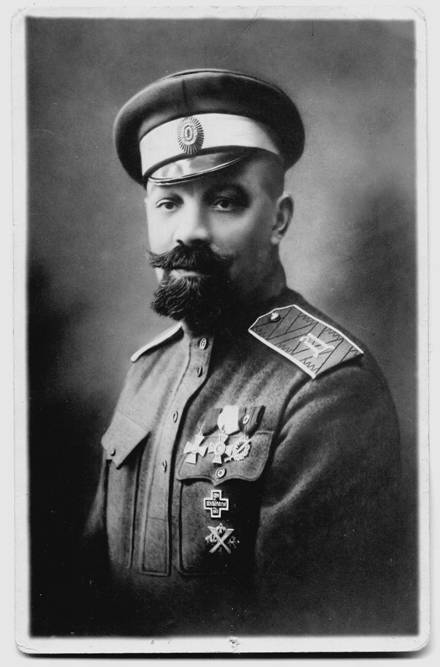 Received Alexander Pavlovich and a very unusual award. The chief of the 85 th Vyborg Infantry Regiment was the German Emperor Wilhelm II. After the regiment returned from the Far East, the Kaiser sent his son Adalbert to his sponsors to express admiration for the valor and courage of the Russian soldiers. The German prince was represented by some of the most distinguished officers. With his peer second lieutenant Kutepov, the heir to the German throne spoke for almost half an hour, asking in detail about the affairs of the regimental intelligence officers. And at the end of the visit he granted him the German Order of the Crown of the 4 degree!
Received Alexander Pavlovich and a very unusual award. The chief of the 85 th Vyborg Infantry Regiment was the German Emperor Wilhelm II. After the regiment returned from the Far East, the Kaiser sent his son Adalbert to his sponsors to express admiration for the valor and courage of the Russian soldiers. The German prince was represented by some of the most distinguished officers. With his peer second lieutenant Kutepov, the heir to the German throne spoke for almost half an hour, asking in detail about the affairs of the regimental intelligence officers. And at the end of the visit he granted him the German Order of the Crown of the 4 degree!Transfiguration
From December 1906, the fate of Aleksandr Pavlovich turned out to be connected with the Life Guards Transfiguration Regiment. In this oldest military unit of the Russian army, he served as the head of the training team, headed regimental intelligence officers and machine-gunners, and commanded a company. Mentor was harsh, but patient and caring, who loved to repeat that “only with the observance of external discipline, the inner is created, and the Russian person lacks it most of all with all his talent”.
Strictly asking for the slightest omissions, Kutepov, along with this, practically every weekend organized excursions to St. Petersburg museums, art galleries and theaters for recruits. This, by the way, was not welcomed by all colleagues, but the authorities were encouraged. And because of this, a young officer who was intelligent, disciplined, and demanding of himself and his subordinates quickly grew in service.
In 1912, Pavel Alexandrovich Kutepov passed away, and on the shoulders of a twenty-eight-year-old Guards Staff Captain, besides his service duties, he took care of two sisters and two brothers, whom he now had to educate and give an opportunity to get a higher education. If before that, the Transfiguration Guardsman lived modestly, having no other income than the officer’s salary, now his lifestyle can be called ascetic. But thanks to his efforts, both girls were enrolled in the Higher Courses for Women at the Smolny Institute, one of the brothers became the cadet of the St. Petersburg Military School, the second - a student at Moscow University. Alexander Pavlovich got his own family only in the autumn of 1918 ...
1 August 1914, the Preobrazhensky Regiment marched to the front along with the rest of the guards. Kutepov could remain in the rear - he was offered the post of commander of the reserve battalion, who remained in the capital to train new recruits. But Alexander Pavlovich chose this appointment as the commander of a military company.
And it began! 20 August 1914, near the village of Vladislavovka, southwest of Lublin, the regiment participated in hand-to-hand combat. Kutepov rushed into a fight at the head of his company and, in the midst of the fight, received a bullet in his thigh, which had broken a bone. He returned to the regiment only in November and was again in the center of the lead whirlwind. 30 March 1915, a new injury, this time frag. Again, treatment at the hospital and return to service before the onset.
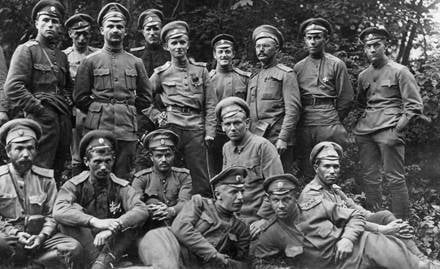 15 July Transfiguration received the task to take the village of Raamesto by the river Stokhod. Before it came to the bayonet, the regiment half-verst was walking knee-deep or even waist-deep in water through the marsh under murderous machine-gun fire. In the second battalion, all the officers were beaten out, except for Captain Kutepov. He led the battalion into the last throw. And then, having occupied the village, he managed to beat off two German counterattacks until darkness, until a live-ranger came to the rescue.
15 July Transfiguration received the task to take the village of Raamesto by the river Stokhod. Before it came to the bayonet, the regiment half-verst was walking knee-deep or even waist-deep in water through the marsh under murderous machine-gun fire. In the second battalion, all the officers were beaten out, except for Captain Kutepov. He led the battalion into the last throw. And then, having occupied the village, he managed to beat off two German counterattacks until darkness, until a live-ranger came to the rescue.On July 27, near the village of Petrilovo of Vladovsky district, Lomzhinskaya province, the Germans subjected the regiment's positions to powerful artillery fire, almost completely destroyed the 3 company that was in the first trench, and then launched an attack. The 4 Company of Kutepov was in reserve that day. Seeing the plight of colleagues, the captain, without waiting for the order, rushed with his guards to the counterattack. During the melee, boiling in dilapidated trenches, was wounded for the third time. But when the orderlies laid Alexander Pavlovich on a stretcher, he ordered to carry himself not to the rear, but forward. And not far behind the soldiers who have already driven the Germans ...
For courage shown in the Petrilovsk battle, which allowed the regiment to hold their positions, Kutepov was awarded the Order of St. George of the 4 degree and was appointed commander of the Sovereign (1) company.
In the next year, 1916, Alexander Pavlovich became the commander of the battalion and the owner of the St. George weapon. Moreover, for the battle of 7 – 8 in September at Kukharsky Forest on the Bug coast, in which the captain showed not only personal fearlessness, but also outstanding commanding qualities, Kutepov, bypassing the next rank of lieutenant colonel, was immediately promoted to colonel and appointed deputy regiment commander.
The last defender of the monarchy
The fateful 1917 year has advanced on Russia. February 23 Bolsheviks brought workers to the streets of Petrograd with slogans "Down with the war!" The commander of the troops of the Petrograd Military District, General S. S. Khabalov, to whom 24 of February was given full authority in the seething capital, refused to use troops. This was a fatal mistake, since there were only 3500 police officers in a city of two million people. Yes, and they are divided into patrols on the 2 – 3 man, so the workers' detachments and gangs of the criminal element easily disarmed a few representatives of the law.
Riots extended. 27 February in Petrograd, the first case of the transition of the military team to the side of the rebels: a non-commissioned officer Kirpichnikov shot in the back the company commander, rebelled the military unit and led her out into the street. With the support of armed soldiers, workers ’teams and detachments of students seized an arsenal, burned the court, ruthlessly killed about two dozen policemen and guards, released prisoners from prison, most of whom were criminals.
The government was in prostration. General Khabalov reported to the Minister of War that he could hardly count on 160 loyal soldiers from the 2000-thousandth garrison. And here the surname of Kutepov unexpectedly surfaced.
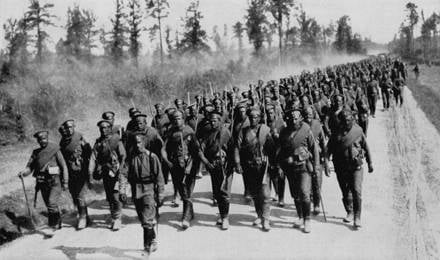 At this time, Alexander Pavlovich was in Petrograd on a three-week vacation. On February 27, he was summoned to the district commander and his order was appointed as the commander of a special detachment entrusted with restoring order in the city. After that, General Khabalov completely removed from the case. And Colonel Kutepov began to act!
At this time, Alexander Pavlovich was in Petrograd on a three-week vacation. On February 27, he was summoned to the district commander and his order was appointed as the commander of a special detachment entrusted with restoring order in the city. After that, General Khabalov completely removed from the case. And Colonel Kutepov began to act!Subsequently, Soviet historians will declare him an executioner, who ordered the shooting of peaceful demonstrations of workers and housewives. These statements are not true. Yes, Kutepov, severely restored the law on the streets of the capital. But the teams subordinate to him did not shoot indiscriminately at everyone and everything, especially at unarmed ones. They only stopped looting, murder of civilians and the defeat of state institutions, Petrograd museums and theaters - including. Weapons were used only against outraged, anarchically-minded soldiers, sailors and Bolshevik militants, by the way, well-armed. Therefore, the dead and wounded were on both sides.
On the second day of the desperate efforts, Kutepov’s squad from everywhere took the Winter Palace, but was forced to leave it at the request of Grand Duke Mikhail Alexandrovich, the brother of the still reigning monarch, in whose favor Nicholas II would soon abdicate the throne. Then Kutepov occupied the Admiralty, but from there he had to leave on the orders of the Minister of the Navy Admiral I. K. Grigorovich. The indefatigable Colonel, who still had 1100 loyal fighters, 12 guns and 15 machine guns decided on the last desperate step - with one throw, as it often happened on the front, he occupied the Peter and Paul Fortress!
This citadel of the time of Peter the Great could easily become the impregnable stronghold of the monarchy, until the troops loyal to the king arrived in the city. But on the night of March 1, the Minister of War, General M. A. Belyaev, personally ordered Colonel Kutepov to leave the fortress, disband the detachment and leave the city for the front in the location of his regiment.
In the evening, March 1 and Belyaev, and Grigorovich, and other Russian ministers themselves were in the same Peter and Paul Fortress. But already as arrested ...
In his "March of the seventeenth," A. I. Solzhenitsyn devoted several chapters to the actions of Kutepov's detachment. They conclude with this conclusion: "He managed to do a little, but if out of a thousand officers in those days in Petrograd, if only one hundred were still done for the same amount, then no revolution would have happened." And there is probably nothing to add here.
... 2 April 1917, Alexander Pavlovich was appointed commander of the Life Guards Preobrazhensky Regiment. Two months later, the Russian army launched its last offensive on the German front. Due to the extreme politicization of the troops, it developed unsuccessfully and ended with a German counterstrike. On the elimination of the enemy breakthrough was thrown one of the last combat-ready compounds - the Peter Brigade, which included the Semenovsky and Preobrazhensky regiments.
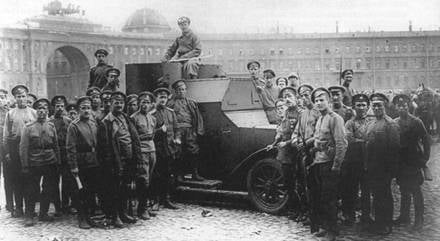 On July 7, Kutepov, who remained behind the brigade commander, led the battle near the village of Mshany. First, the guards repelled the onslaught of the enemy, then crushed it and wanted to counterattack. But they were not supported by the neighboring units, and the brigade was forced to retreat. Alexander Pavlovich, who was in the battle formations of the 1 Battalion of Preobrazhensky, covering the withdrawal of the compound, received a strong concussion at close rupture of a heavy projectile, but refused to evacuate.
On July 7, Kutepov, who remained behind the brigade commander, led the battle near the village of Mshany. First, the guards repelled the onslaught of the enemy, then crushed it and wanted to counterattack. But they were not supported by the neighboring units, and the brigade was forced to retreat. Alexander Pavlovich, who was in the battle formations of the 1 Battalion of Preobrazhensky, covering the withdrawal of the compound, received a strong concussion at close rupture of a heavy projectile, but refused to evacuate.For that operation, Kutepov was presented to the Order of St. George of the 3 degree, but due to the final collapse of the front he did not have time to get it. Although at the same time, another, no less honorable award flashed on his faded tunic: Alexander Pavlovich received a soldier’s Cross of St. George of the 4 degree by the decision of the regimental duo of the Cavaliers of St. George. Few officers (and even 1917 in the summer) were honored with such an honor!
And the country and the army continued to plunge into revolutionary chaos. Understanding that he was no longer able to keep the oldest military unit of the Russian Guard in combat readiness, Kutepov 2 of December 1917 of the year issued an order to disband the Preobrazhensky regiment. After that, with a small group of officers he began to make his way to the Don, where the generals Alekseev and Kornilov were already gathering all those who were ready to start a fight with the new government.
Russia froze a step away from the fratricidal slaughter ...
Cruel idealist
December 24 Kutepov arrived at the headquarters of the Volunteer Army and was immediately appointed head of the Taganrog garrison. There he quickly formed an officer company numbering in 200 with two field guns, and successfully fought off the Bolshevik detachments for a whole month trying to occupy the city.
Then there was the famous Ice Campaign, which Alexander Pavlovich began as a company commander, and graduated as commander of the Kornilov regiment, removing from the Ekaterinodar everything ... 67 surviving officers - colonels, captains, staff captains who went to bayonet attacks by ordinary soldiers!
In the 2 Kuban campaign, Kutepov successively commanded a regiment, brigade, division. And he continued to personally lead a chain of officers and junkers to attack, showing incredible courage and composure, which won indisputable authority among the "volunteers."
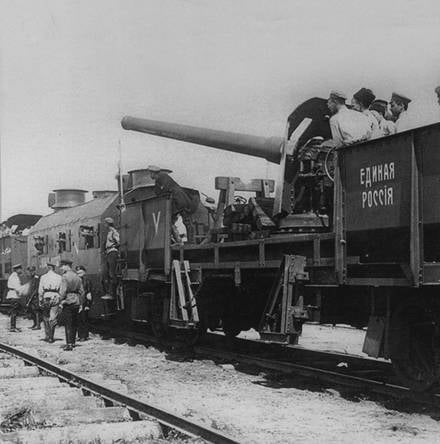 August 26 1918, after taking Ekaterinodar and Novorossiysk, Alexander Pavlovich is appointed by the Black Sea military governor. By "his" province, he ruled harshly, even cruelly, in the bud, suppressing any manifestation of lawlessness. For the bandits, speculators, deserters, marauders, there was only one punishment - the gallows. Death punished incitement to Jewish pogroms. And after two merchants were hanged, who were trying to fool a bribe to the governor for receiving an order for food supplies to the army, they also forgot about such a sin as bribery in Kutepov's possessions.
August 26 1918, after taking Ekaterinodar and Novorossiysk, Alexander Pavlovich is appointed by the Black Sea military governor. By "his" province, he ruled harshly, even cruelly, in the bud, suppressing any manifestation of lawlessness. For the bandits, speculators, deserters, marauders, there was only one punishment - the gallows. Death punished incitement to Jewish pogroms. And after two merchants were hanged, who were trying to fool a bribe to the governor for receiving an order for food supplies to the army, they also forgot about such a sin as bribery in Kutepov's possessions.The thieving merchants and the liberal intelligentsia called the Black Sea Governorate "Kutepia". But it was there that, for the first time during the Civil War, Alexander Pavlovich organized the work of Zemsky assemblies, which included representatives of all classes. There were opened shops for workers, where goods were sold at discounted prices. Corporate income tax was set lower than before the revolution, and commerce began to revive ...
Still, at the administrative post he was unwelcome to many, and 26 in January 1919, Kutepov, who had recently become a general, was appointed commander of the 1 Army Corps. It was he who took September 30 Orel and Mtsensk. None of the white team has ever come so close to Moscow!
Then began the retreat, which ended with the evacuation of troops from Novorossiysk to the Crimea. It was covered by the Drozdov regiment, which until recently was kept on shore. The remnants of the regiment were already preparing for death, but then the destroyer Pylky flew into the port - then General Kutepov returned for the Drozdovites, despite the ship's critical overload, placed almost 300 people on board and left with them to Kerch.
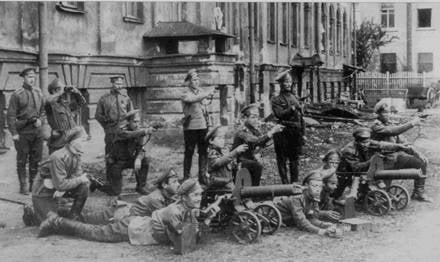 In May, the 1920 corps was the body of Kutepov who breached the Perekop fortifications of the Reds, which allowed the Wrangel army to reach the operating room. He was the last to go back to the peninsula in October after the terrible defeat of whites in Northern Tavria.
In May, the 1920 corps was the body of Kutepov who breached the Perekop fortifications of the Reds, which allowed the Wrangel army to reach the operating room. He was the last to go back to the peninsula in October after the terrible defeat of whites in Northern Tavria.14 November The White Army left the Crimea and on the 166 ships headed for the Turkish coast. Resigned home and General Kutepov. But he did not believe that the struggle was lost ...
“Give order!”
Once in Gallipoli, Wrangel and Kutepov set about preserving the army as a political and military force. And if the execution of the first part of this task fell on the baron, then Alexander Pavlovich took an active part in implementing the second. And it was harder than to rush with the troops to attack or to put things in order in the war-torn Russian provinces. Then the general had the power, the subordinates had a debt, and now Kutepov had a weak and weak mass of people, in which everyone had the right to leave, leave, disappear at any moment. Of all the means of influence, Alexander Pavlovich had only moral strength, his own will and personal example.
“Give order!” Kutepov ordered briefly. In the morning, dressed in a clean, field-pressed uniform, with Georgievsky weapons he bypassed the military camp under construction - not a refugee village, but a camp erected following the age-old structure of the Russian troops: regimental tents, regimental churches, a guardhouse, and flag sentries ...
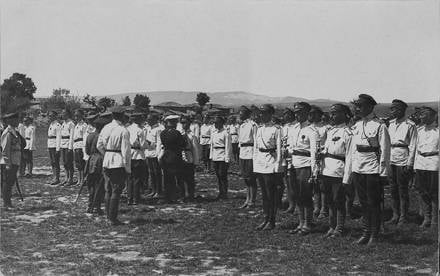 From the first days Alexander Pavlovich began to demand from everyone complete submission to the military order. To strengthen discipline, he even revived the duel, rightly believing that fear of getting a bullet would deter boors and scoundrels. At first the troops grumbled, then resigned, then retracted. And finally realized that this is the only correct way.
From the first days Alexander Pavlovich began to demand from everyone complete submission to the military order. To strengthen discipline, he even revived the duel, rightly believing that fear of getting a bullet would deter boors and scoundrels. At first the troops grumbled, then resigned, then retracted. And finally realized that this is the only correct way.Very soon, officer schools, general education courses, cadet schools, a gymnasium, a kindergarten, a library, a theater, and various workshops began to open in the Gallipol camp. There were sports sections, began to be held competitions in football, athletics, gymnastics and fencing.
27 January 1921, the review of the troops and the parade. There were about 50 thousands of Russian soldiers, officers, and Cossacks in the camp. Before Wrangel, invited by French, Turkish and Greek high-ranking officers, General Kutepov with music and banners unfolded only his corps - almost 15 thousands of hardened fighters, who had almost more toned appearance than in Tsarist Russia. But the joy in the eyes of the allies did not flicker: to the surprise and dismay in front of them, it was not a crowd of hungry and tattered vagrants ready to serve for any handout, but a real armed force that could not be ignored. And they tried to get rid of the Russians.
After the resettlement of Gallipoli in the Slavic countries, Kutepov lived in Bulgaria and Serbia. At the beginning of 1924, Alexander Pavlovich was received by Grand Duke Nikolai Nikolaevich, around whom forces were concentrated, who decided to continue the active struggle against Soviet power. He proposed Kutepov to take over "the work of special purpose in relations with Russia." The general agreed.
And this consent can be considered the birthday of the military émigré organization ...
Enemy No. 1
Immediately after the death of Baron Wrangel in April 1928, Alexander Pavlovich became the head of the Russian All-Russia Union (EMRO), the largest and most active émigré organization with many territorial divisions in Europe, the Far East, North and South America, Australia. The intelligence services of Poland, Romania, England, Japan, France actively cooperated with it, because the EMRO had an extensive intelligence network in Russia and its own “windows” on the Soviet border.
Thus, the general turned into a major political figure, and taking into account his active character and iron will - a very dangerous figure for the Soviet government. This could not be ignored by the intelligence services of the USSR, for which Kutepov became the enemy number 1.
Already in the middle of 1920, a special group of Comintern and intelligence officers was created under the chairman of the OGPU Menzhinsky, whose main goal was the destruction of political opponents of the USSR, primarily from among Russian émigrés and security officers. She received the task of eliminating the EMRO Chairman. Moreover, Kutepov, who lived in France, was supposed not only to be liquidated, but to be kidnapped, taken out to the Soviet Union, tried by an indicative court and executed.
26 January 1930, Alexander Pavlovich left his home and went to the church, where a memorial service was to be held on the occasion of the anniversary of the death of one of his comrades. And gone.
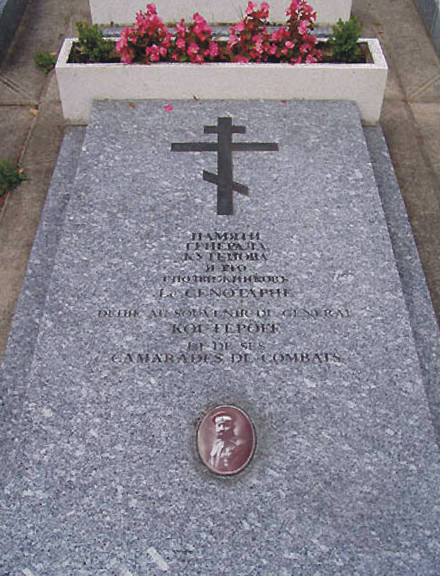 During the investigation, the clinic cleaner Auguste Steimetz showed that on that day he saw through the window a large gray-green car, standing on Rusesel street, near which two tall men were trampling in yellow coats and a red taxi nearby. Immediately on the corner was a policeman. From the side of the boulevard of Invalides along the street Udino was a man of medium height with a black beard, dressed in a black coat. When he caught up with the gray-green car, people in yellow coats grabbed him and shoved him into the car. The police officer got into the same car, and the car rushed towards the Invalides Boulevard, and a red taxi followed it too ...
During the investigation, the clinic cleaner Auguste Steimetz showed that on that day he saw through the window a large gray-green car, standing on Rusesel street, near which two tall men were trampling in yellow coats and a red taxi nearby. Immediately on the corner was a policeman. From the side of the boulevard of Invalides along the street Udino was a man of medium height with a black beard, dressed in a black coat. When he caught up with the gray-green car, people in yellow coats grabbed him and shoved him into the car. The police officer got into the same car, and the car rushed towards the Invalides Boulevard, and a red taxi followed it too ...In the USSR, Kutepov did not appear. There are still several versions of his death, none of which is documented.
According to one of them, Alexander Pavlovich, who showed active resistance, was killed in the car, and then secretly buried somewhere in the suburbs of Levallois-Perret. This information, many years after Kutepov’s disappearance, was allegedly reported to the French historian Jean Ellenstein by Communist deputy Maurice Oneel, whose brother was involved in the abduction.
According to another Kutepov, a large dose of morphine was introduced in the car. The disconnected general was taken to Marseille and brought on board a Soviet merchant ship at night. On the way to Odessa, the injections continued, and one day the prisoner died of a heart attack. The body was either thrown into the sea, or brought to Moscow to report on a successful operation, and then quietly cremated.
All the direct participants in the abduction have long since passed away - someone was shot during the repressions of the second half of 1930, someone died under mysterious circumstances during interrogation in the investigator's office in the middle of 1950. So the truth about the last minutes of Alexander Pavlovich Kutepov is unlikely to ever be known.
In Paris, the cemetery of Sainte-Genevieve-des-Bois has a symbolic grave. But under the slab of gray marble - empty. The man, whose remains were supposed to rest there, just sunk into obscurity.
Information